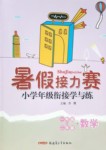题目内容
17.Daniel Anderson,a famous psychologist,believes it's important to distinguish television's influences on children from those of the family.We tend to blame TV,he says,for problems it doesn't really cause,overlooking our own roles in shaping children's minds.One traditional belief about television is that it reduces a child's ability to think and to understand the world.While watching TV,children do not merely absorb words and images (影像).Instead,they learn both explicit(明确的) and hidden meanings from what they see.Actually,children learn early the psychology of characters in TV shows.Furthermore,as many teachers agree,children understand far more when parents watch TV with them,explaining new words and ideas.Yet,most parents use an educational program as a chance to park their kids in front of the set and do something in another room.
Another argument against television is that it replaces reading as a form of entertainment.But according to Anderson,the amount of time spent watching television is not related to reading ability.TV doesn't take the place of reading for most children; it takes the place of similar sorts of recreation,such as listening to the radio and playing sports.Things like parents'educational background have a stronger influence on a child's reading."A child's reading ability is best predicted by how much a parent reads."Anderson says.
Traditional wisdom also has it that heavy television-watching lowers IQ (智商) scores and affects school performance.But here,too,Anderson notes that no studies have proved it.In fact,research suggests that it's the other way around."If you're smart young,you'll watch less TV when you're older,"Anderson says.Yet,people of lower IQ tend to be lifelong television viewers.
For years researchers have attempted to show that television is dangerous to children.However,by showing that television promotes none of the dangerous effects as conventionally(传统地) believed,Anderson suggests that television cannot be condemned without considering other influences.
56.By watching TV,children learnB.
A.images through words
B.more than explicit meanings
C.more about images than words
D.little about people's psychology
57.An educational program is best watched by a childC.
A.on his own
B.with other kids
C.with his parents
D.with his teachers
58.Which of the following is most related to children's reading ability?D
A.Radio-listening
B.Television-watching
C.Parents'reading list
D.Parents'educational background
59.Anderson believed thatC.
A.the more a child watches TV,the smarter he is
B.the younger a child is,the more he watches TV
C.the smarter a child is,the less likely he gets addicted to TV
D.the less a child watches TV,the better he performs at school
60.What is the main purpose of the passage?D
A.To advise on the educational use of TV.
B.To describe TV's harmful effects on children.
C.To explain traditional views on TV influences.
D.To present Anderson's unconventional ideas.
分析 本文叙述著名心理学家Daniel Anderson对孩子们看电视的看法,打破了以往人们认为看电视对孩子不好的想法.他认为孩子们看电视不知学到显现出来的东西;父母陪孩子看电视,孩子可以学到更多知识;孩子看电视并没有代替孩子阅读,并没有影响孩子的智商.
解答 56.B 细节理解题.根据第二段的Instead,they learn both explicit and hidden meanings from what they see.可知孩子们通过看电视,可以学到显性和隐藏的意义,因此不仅仅学到隐藏的意思.故选B.
57.C 推理判断题.根据第二段的Furthermore,as many teachers agree,children understand far more when parents watch TV with them"孩子们有父母陪着看电视理解的更多",故推断教育节目最好是父母陪着孩子看.故选C.
58.D 细节理解题.根据第三段的Things like parents'educational background have a stronger influence on a child's reading.可知父母的教育背景对孩子的阅读有很强的影响.故选D.
59.C 细节理解题.根据第四段的"If you're smart young,you'll watch less TV when you're older"如果你年轻聪明,当你年龄大些的时候就会看电视看得越来越少.可知越是聪明的孩子越不沉迷于看电视,故选C.
60.D 推理判断题.根据最后一段的Anderson suggests that television cannot condemned without considering other influences."Anderson认为不应该按照常规,不考虑电视的其他影响而去谴责电视"故推断这篇文章的目的是呈现Anderson打破常规的想法,故选D.
点评 故事类文章在阅读过程中,我们一直在某个线索的引导下,随着作者的思路去了解一个故事或一件事情的始末,因此会感到比较轻松.命题往往从故事的情节、人物或事件之间的关系、作者的意图和态度、故事的前因和后果等方面入手,考查学生对细节的辨认能力以及推理判断能力. 阅读故事类文章时,应注意把握主旨大意,弄清主要情节,立足文章的内容揣摩作者的态度和意图,根据文章的情节展开合理的想象,从而达到解题的目的.

 桃李文化快乐暑假武汉出版社系列答案
桃李文化快乐暑假武汉出版社系列答案 优秀生快乐假期每一天全新寒假作业本系列答案
优秀生快乐假期每一天全新寒假作业本系列答案 暑假接力赛新疆青少年出版社系列答案
暑假接力赛新疆青少年出版社系列答案